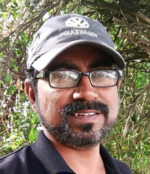TRANSLATED FROM THE HINDI BY MOULINATH GOSWAMI
Bidding Adieu to a City – 5
It would be nice
if we stand in the open of the topmost terrace
of this city and fly kites
And together we laugh out loud, as if to tell
watch out, we can still laugh in this manner
And sing full throated, as if to tell
know for yourself, we are singing too
And dance with all our verve, as if to tell
see for yourself
and concede defeat.
We two
in the open
of the topmost terrace in this city
From there we would shout, run after one another
shriek, jump about, and
scatter endless coloured paper strips
in the air.
We would spread so many cotton balls
over the city
that they would look like raindrops everywhere
We would then come down
tightly embrace the old peepal tree in Rani Kamala Park
and shake it, and then ride a pedal boat
and churn the water of the pond
raking up such a wave
that it would spray like a fountain
and pour over the entire city
like our anger
Come, Tapti
let us watch through the binoculars
how much, the entire rich and elite of this city
have turned into ashes
how much coal has been deposited
on their eyebrows.
Bidding Adieu to a City – 6
One day we shall pack all our belongings
board a train and set out, Tapti!
We shall not even
cast a glance at the place, where
despite living for so long, we can no longer live
where we kept melting our bones all day and night
and kept laughing behind the backs of people
in our quest for something molten
Tapti, I would wish
we break into laughter as we begin to forget this place
and between our conversations
smile while we deride this place
and think, a day will come
when there won’t be places like this in the entire world
Then Tapti, there would be windows
and trees would run in circles
and some stray calf would set hoof over the pea fields
We would keep moving on our journey
past one village after the other, and cities
Outside the railway window
the world would continue to revolve
the green world
filled with brownish mud houses.
Then I would tell
we’ve done the right thing, what we’ve done is right
that we’ve left them
those who had from the very beginning
already deserted us, and timeless people like us
for the sake of their own narrow world
We shall wipe off from our memories
even the last vestige
of a few cunning relationships as these
and move ahead with all our belongings
past one village after the other, and cities
and lives, and experiences
But at the end
where shall we halt, Tapti?
Also, read Bidding Adieu to a City (part I & II) and Bidding Adieu to a City (part III & IV) by Uday Prakash, translated from The Hindi by Moulinath Goswami, published in The Antonym:
Follow The Antonym’s Facebook page and Instagram account for more content and exciting updates.




























0 Comments